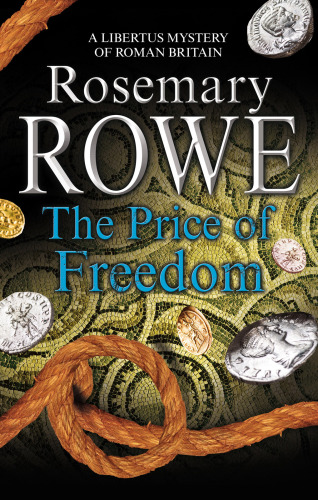
The Price of Freedom
Libertus Mystery of Roman Britain Series, Book 17
کتاب های مرتبط
- اطلاعات
- نقد و بررسی
- دیدگاه کاربران
نقد و بررسی

October 14, 2013
Rowe’s 14th whodunit set in second-century Britain (after 2012’s A Whispering of Spies) offers a surprisingly undramatic story line, given the events roiling the Roman Empire at the time. News of the death of the capricious and tyrannical emperor Commodus alarms the citizens of Glevum (the modern-day Gloucester). Given the inconsistencies in reports of the cause of death, some fear that the emperor has spread the rumor of his death as a ruse to identify those opposed to his regime who might now express their political views. Against this backdrop, magistrate Gaius Mommius Genialis, who’s about to marry a widow whose first husband perished at sea, hires pavement maker Longinus Flavius Libertus to replace a mosaic in the widow’s home that the artisan once made depicting a boat. Genialis promises Libertus a large bonus if he completes the work quickly. When Genialis vanishes, ascertaining his fate becomes the book’s main puzzle. Rowe has done a better job in previous entries of mixing mystery with history.

Starred review from December 4, 2017
In Rowe’s superb 17th whodunit set in second-century Roman Britain (after 2016’s The Ides of June), Libertus, a Gloucester pavement-maker with a knack for solving mysteries, is sorry to hear from his patron, Marcus Aurelius Septimus—“one of the wealthiest and most powerful men in all Britannia”—that Acacius Flauccus, a tax official from whom Libertus was anticipating a lucrative commission, has hanged himself. The note left near Flauccus’s corpse reveals that he took his life out of shame for having lost tax revenue at the gaming table. Certain that the death was a suicide, Marcus is concerned that local government officials will need to repay the shortfall in taxes. Evidence that Flauccus was robbed before his death, however, would shift that financial responsibility to the dead man’s estate. Marcus dispatches Libertus to investigate, and the artisan soon finds more questions than answers. Besides effortlessly integrating such period details as telling time in an era before clocks into the narrative, Rowe perfectly balances character and plot.

January 1, 2018
Britannia, CE 193. Citizen Libertus is summoned to the home of his patron, Marcus Aurelius Septimus. While Libertus is flattered, he knows Marcus' invitations never come without strings. Marcus informs him that he plans to nominate Libertus as a candidate for the curia, which is the very last thing Libertus wants. Almost before Libertus has a chance to take this in, a messenger arrives with dire news. Tax collector Acacius Flauccus has hanged himself, and his suicide note indicates he killed himself because he gambled away all the taxes he had collected to send to Rome. The implications are dreadful: Marcus and the other curia members will be responsible for coming up with the lost tax money to deliver to the Roman emperor. Marcus orders Libertus to investigate, as Libertus has done for his patron many times before. Libertus sets off for Acacius' home, but the journey is fraught with danger, and the investigation puts Libertus' life in peril. Fine period detail, nicely rounded characters, light humor, and a clever plot make for an excellent read.(Reprinted with permission of Booklist, copyright 2018, American Library Association.)

























دیدگاه کاربران